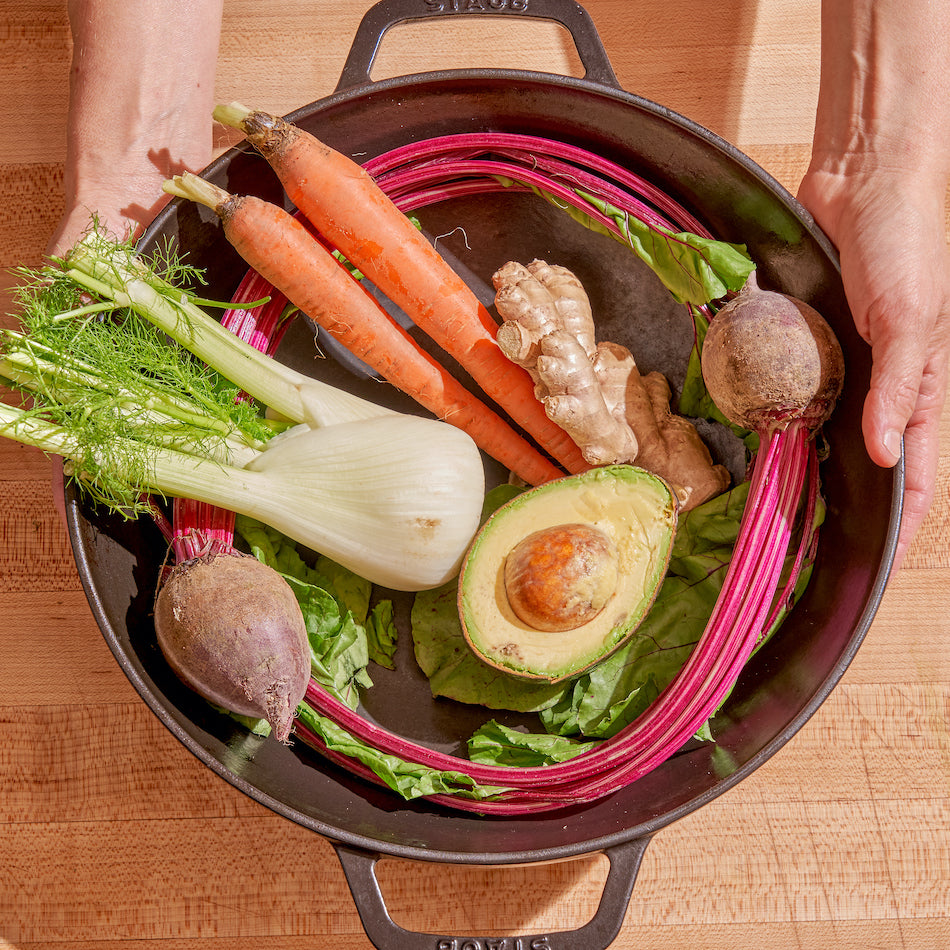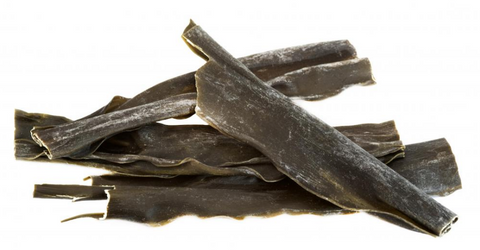
The Healing Power of Vegan "Bone" Broth | Organic Pharmer
Share
You may have encountered the health trend of drinking bone broth for gut health, but have you heard of our Vegan “Bone” Broth? Turns out it may be more nutritious than its animal-based alternative, and we use a key secret ingredient called kombu to give it a gelatinous quality. Kombu is a nutritional powerhouse from the sea, but what makes it so special? How does a vegetable broth compare to one made with animal products? We’re going to explore all of that and more.
What is Kombu?

Kombu is a Japanese word for a variety of species of seaweed that are used in cooking. Most of the species called kombu are in the laminaria family of seaweeds, which are brown in color and include the seaweed often called kelp that grows from the seafloor up to the surface of the sea in long ropy strands. This algae has been used as a food source in Japan and large parts of East Asia for generations. In Japan specifically, kombu is used as a main ingredient in a type of broth called dashi, and is also used to season sushi rice, among other uses.
What are the benefits of eating Kombu?
Kombu is an excellent source of various minerals, especially calcium, which it contains in higher levels than traditional sources like dairy. For example an 8 gram serving of kombu contains 37% of the recommended daily intake of calcium, while consuming the same amount of cheese would give only 5% of the recommended daily intake. Iron and copper are also found in higher levels in kombu than in meat. Kombu is also rich in iodine, which is essential for proper thyroid function, as well as magnesium. (It should be noted however, that certain thyroid disorders can be negatively affected by too much iodine, so always consult your doctor prior to changing your diet.) Magnesium is a key element that’s used in a wide range of biological functions, including nervous system regulation, protein synthesis, energy production, and gene maintenance.
Kombu is also a source of both insoluble and soluble fiber, which are both crucial for gut health. Kombu contains unique enzymes that help to break down carbohydrates, like those found in beans, and make them more digestible. This is one of the reasons we use our Vegan Bone Broth in all of our soups, because it makes them highly digestible and thus easier to absorb the nutrients within them. It’s also why our therapeutic broth is the basis of our Phast program, so that you get all of the nutrients and beneficial fiber from this sea superfood while your body is healing and regenerating in a fast-mimicking state.
Broth as Superior Hydration
There’s no doubt that our healing Vegan Bone Broth recipe is packed with vitamins and minerals from the choice ingredients in it, including kombu. But another often overlooked benefit to drinking broth is its ability to provide the body with superior hydration than that of water alone. That’s because broth contains a variety of electrolytes, as well as carbohydrates and proteins which help to retain fluids in the body. It’s commonly known that good hydration is very important for health, but new studies even show that hydration is linked to healthy aging and a lack of it can lead to chronic disease. Water is necessary for virtually all of the body's daily processes, so it makes sense that a lack of proper hydration can negatively affect everything from skin health, to cognition, to digestion and renal function.
Bone Broth vs. the Vegan alternative

Traditional bone broth, made from boiling water with animal bones, is touted as being beneficial for the body due to its high collagen content. Collagen is essentially a protein, which when broken down in the gut is absorbed as its building blocks, which are individual amino acids. Though Vegan Bone Broth does not contain collagen, it does contain the same building blocks for it, namely the amino acids found in the plants used to make the healing broth. Once in the body, these amino acids can then be used to create collagen within the body. This same process occurs when consuming animal-based bone broth; both broths need to be broken down and digested first, so when you’re consuming the collagen in bone broth, you’re essentially just consuming amino acids, not collagen as a whole.
Another consideration to keep in mind is the comparative nutrient content of animal-based bone broth vs. that of plant-based broth. A study looking at various homemade and store-bought bone broths found that these products only contained less than 5% of the recommended daily intake of calcium and magnesium. When you look at the nutrient content of Vegan Bone Broth, its animal alternative just doesn’t measure up.
How to Incorporate Broth into your routine
Whether you are choosing a therapeutic bone broth or our healing Vegan “Bone” Broth you can easily incorporate it into your life adding it in between meals as a way to supplement both nutrition and hydration for the body. A warm cup of bone broth to start your day is a great way to hydrate the body after a night’s sleep and the mineral-rich liquid will be something that’s easy to digest first thing in the morning. They are both great options for assisting in your healing journey for your microbiome whether it be with IBS or leaky gut. We always recommend adding a case of Vegan Bone Broth to assist with preparing for a cleanse. Really our anti-inflammatory vegan “bone” broth is great to consume at any time during the day. All you need to do is heat it up and you’ve got an easy way to boost your health.


1 comment
Great share. Bone broth is full of essential nutrients and offers a myriad of health benefits.